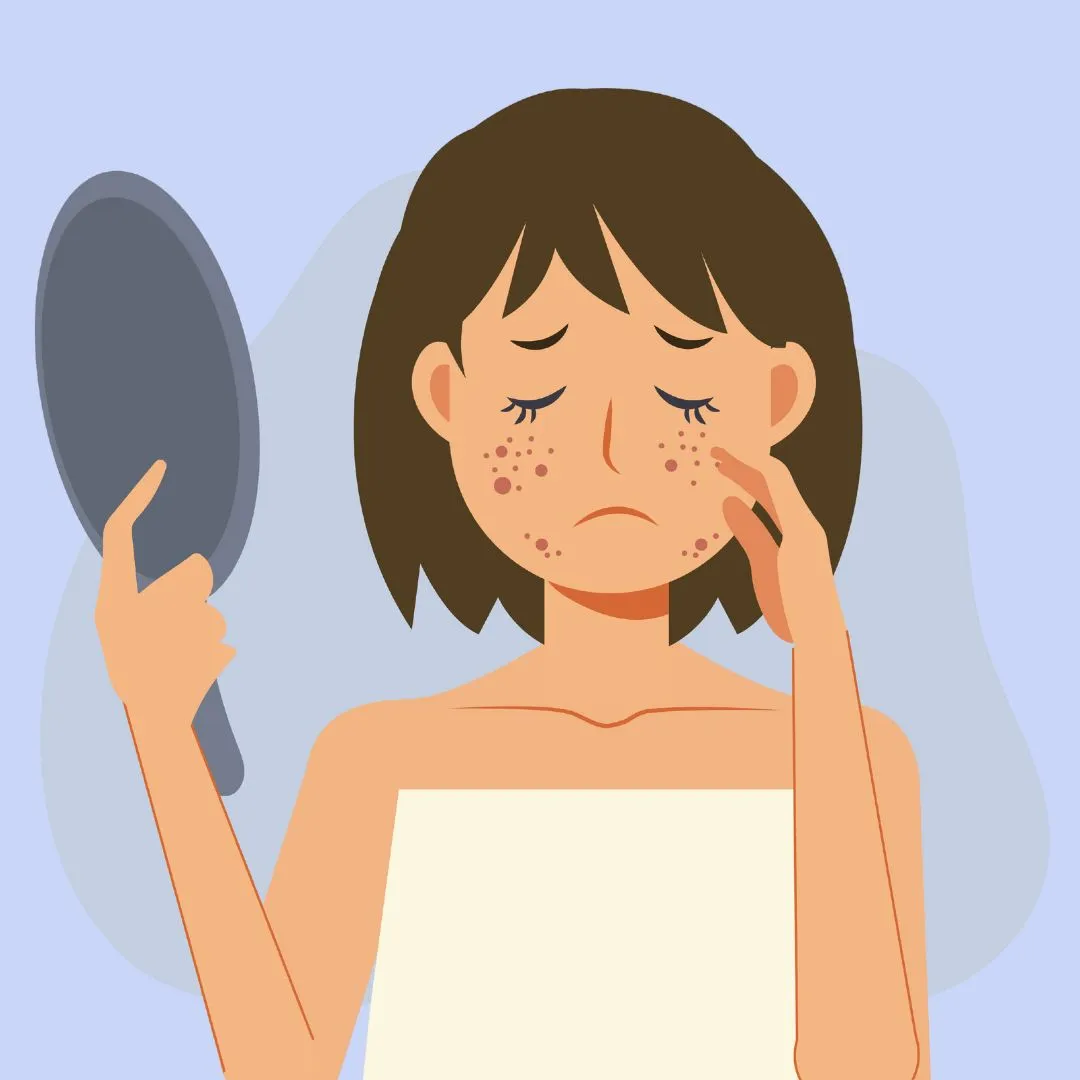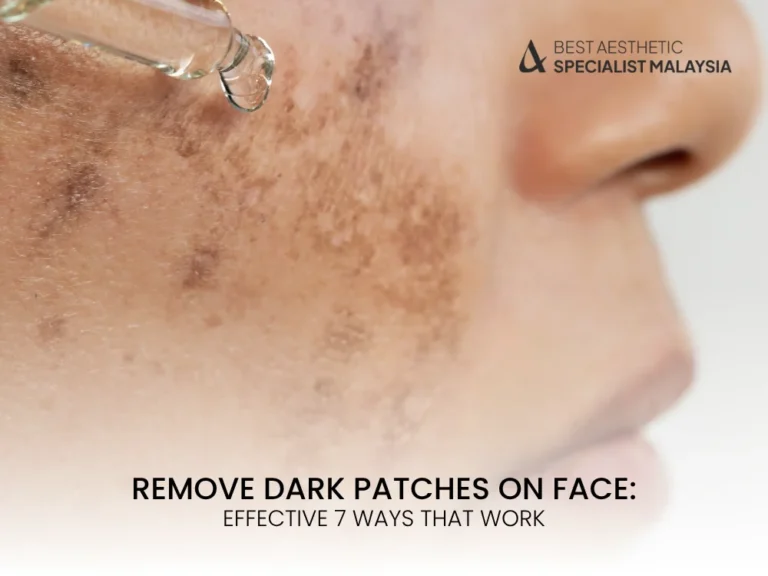Dark patches on the face, also known as hyperpigmentation, can affect people of all ages and skin types. Whether caused by sun damage, hormonal fluctuations, acne scars, or inflammation, these spots can be persistent and emotionally frustrating. The good news? With the right skincare strategy, it’s entirely possible to remove dark patches on face and regain clear, even-toned skin.
This article explores the top dermatologist-approved treatments and proven natural remedies to remove dark patches on face, backed by medical expertise.
What Causes Dark Patches on the Face?
Before diving into solutions, it’s essential to understand the root causes behind facial pigmentation issues:
Sun Exposure
Prolonged UV exposure stimulates melanin production, leading to sunspots or age spots—commonly found on cheeks, forehead, and nose.
Post-Inflammatory Hyperpigmentation (PIH)
PIH occurs after acne, cuts, or other skin injuries heal, leaving behind a dark mark due to excess melanin.
Melasma
Melasma is often triggered by hormonal changes, such as pregnancy or oral contraceptives, and results in symmetrical dark patches on the cheeks and forehead.
Skin Allergies or Reactions
Certain products can irritate the skin, leading to hyperpigmentation as a reaction.
Genetics and Skin Type
People with darker skin tones naturally produce more melanin, making them more prone to hyperpigmentation.

Topical Treatments to Remove Dark Patches on Face
Vitamin C Serums
Vitamin C is one of the most researched and trusted skincare ingredients for brightening the complexion and reducing dark spots. As a potent antioxidant, it neutralizes free radicals that damage skin cells, while also inhibiting the enzyme responsible for melanin production. Over time, consistent use can visibly lighten dark patches and even out skin tone. The key to maximizing its benefits is choosing a stable form, such as L-ascorbic acid, and applying it in the morning under sunscreen. Since Vitamin C also offers some protection against UV damage, it works synergistically with SPF to prevent further pigmentation. For sensitive skin, start with a lower concentration (around 10%) and work your way up to 20% as tolerated.
Retinoids (Retinol or Tretinoin)
Retinoids, derivatives of Vitamin A, are powerful agents for skin renewal. By accelerating cell turnover, they help shed the pigmented upper layers of skin and promote the growth of fresh, evenly toned cells underneath. Retinol is available in over-the-counter formulations, while tretinoin and adapalene may be prescribed for stronger results. Because they can cause dryness and peeling, retinoids should be introduced gradually—starting with twice a week and increasing frequency as your skin adapts. Applying them at night is essential, as they can make skin more sensitive to sunlight. When combined with sunscreen in the daytime, retinoids become a cornerstone in long-term pigmentation control.
Hydroquinone Creams
Hydroquinone has been the gold standard in skin-lightening treatments for decades. It works by inhibiting tyrosinase, an enzyme required for melanin production, effectively reducing the pigment in dark patches. Available in 2% concentrations over-the-counter and up to 4% or higher with a prescription, it’s particularly effective for stubborn spots such as melasma or long-standing post-inflammatory hyperpigmentation. Dermatologists often recommend using hydroquinone in short cycles (around 3–4 months) to prevent potential side effects like rebound pigmentation or skin irritation. Combining it with retinoids or mild steroids in a dermatologist-supervised regimen can boost results while minimizing irritation.
Niacinamide
Niacinamide, also known as Vitamin B3, is a gentle yet effective solution for hyperpigmentation—making it ideal for those with sensitive skin. It not only reduces excess melanin transfer to skin cells but also strengthens the skin’s barrier function, improving hydration and resilience. Typically found in concentrations between 2–10%, niacinamide is suitable for both morning and evening use, and it pairs well with almost all other active ingredients without causing irritation. Beyond its brightening effects, it can reduce redness, control oil production, and improve overall skin texture, offering a multi-benefit approach to complexion improvement.
Azelaic Acid
Azelaic acid is a unique ingredient with dual benefits: it treats acne while fading dark spots left behind. Derived from grains like barley and wheat, it has antibacterial, anti-inflammatory, and tyrosinase-inhibiting properties. This makes it particularly effective for individuals struggling with post-acne marks, rosacea-related redness, or melasma. Generally available in 10% over-the-counter formulations and 15–20% prescription strengths, azelaic acid is well-tolerated even by sensitive skin. Regular use can lead to a smoother, more even complexion without the irritation often associated with stronger acids or bleaching agents.
Professional Treatments to Remove Dark Patches on Face
Chemical Peels
A series of chemical peels—using glycolic, salicylic, or lactic acid—can exfoliate the top layers of the skin and fade discoloration.
Laser Therapy
Fractional or Q-switched lasers can break down melanin deposits under the skin. However, results vary by skin tone and must be administered by certified dermatologists.
Microneedling
Microneedling stimulates collagen production and improves serum absorption, effectively reducing pigmentation with repeated sessions.
Microdermabrasion
This non-invasive exfoliating procedure buffs away the top layer of skin, promoting new, even-toned skin to surface.
Home Remedies That Help Remove Dark Patches on Face
While not as potent as medical treatments, these remedies can complement your skincare routine:
Aloe Vera Gel
Aloe vera contains aloin, a natural depigmenting compound. Apply fresh aloe vera gel daily for soothing and brightening effects.
Licorice Root Extract
Known for its skin-lightening properties, licorice helps reduce melanin production and fade existing dark patches.
Green Tea Extract
Green tea is rich in antioxidants and anti-inflammatory compounds that can help soothe the skin and reduce hyperpigmentation.
Potato Juice or Slices
Potatoes contain an enzyme called catecholase, which may help brighten dark areas when applied consistently.
Apple Cider Vinegar
Its acetic acid content helps gently exfoliate and lighten pigmented skin, but always dilute before use to prevent irritation.
Daily Routine to Prevent and Remove Dark Patches on Face
Consistency is key to achieving and maintaining even-toned skin. Here’s an ideal routine:
Morning Routine
- Cleanser (gentle, non-stripping)
- Vitamin C serum
- Moisturizer with niacinamide
- Broad-spectrum sunscreen (SPF 50)
Evening Routine
- Cleanser
- Retinoid or azelaic acid
- Moisturizer
- Spot treatment with hydroquinone or kojic acid (if prescribed)

Preventing Future & Remove Dark Patches on Face
Always Wear Sunscreen
UV radiation is the leading cause of pigmentation. Even on cloudy days, daily SPF is non-negotiable if you want to remove dark patches on face and prevent their return.
Avoid Picking at Skin
Squeezing pimples or scratching inflamed areas increases the risk of PIH.
Use Non-Irritating Products
Stick to fragrance-free, hypoallergenic products to reduce the chances of allergic reactions and irritation.
Regular Exfoliation
Gentle exfoliation helps remove dead skin cells and encourages new skin turnover, promoting a more even complexion.
When to See a Dermatologist
While many mild cases of hyperpigmentation respond well to home remedies and over-the-counter (OTC) skincare, there comes a point when professional help is the fastest and safest route to clearer skin. If you’ve been consistently using topical treatments—such as Vitamin C, niacinamide, or retinoids—for at least 8–12 weeks without noticeable improvement, it’s time to consider booking a dermatologist appointment. Persistent pigmentation may be a sign of deeper melanin deposits, underlying skin conditions, or hormonal influences that require targeted intervention.
A dermatologist will not only confirm the exact cause of your dark patches but also tailor a treatment plan based on your skin type, pigmentation depth, and lifestyle. They may recommend:
Triple Combination Creams – A dermatologist-prescribed blend of hydroquinone, tretinoin, and a mild corticosteroid, proven to be one of the most effective topical regimens for stubborn pigmentation, particularly melasma.
Custom Compounding Formulas – Personalized creams that combine specific active ingredients in strengths tailored to your skin’s tolerance and needs.
In-Clinic Chemical Peels – Professional-grade peels using glycolic acid, TCA (trichloroacetic acid), or salicylic acid to exfoliate and fade pigmentation more rapidly than at-home products.
Laser or Light-Based Treatments – Options such as Q-switched lasers, intense pulsed light (IPL), or fractional lasers that break down pigment clusters, leading to gradual lightening of dark patches.
Seeking professional advice early—especially for conditions like stubborn melasma, post-inflammatory hyperpigmentation, or deep-set dermal pigmentation—can save you months (or even years) of trial and error. Dermatologists also help prevent common pitfalls, such as overuse of strong bleaching agents, which can damage the skin barrier and cause rebound pigmentation.
Remember: pigmentation issues are often chronic and require ongoing maintenance. A dermatologist can guide you through not just treatment but also long-term prevention strategies, ensuring results that are both visible and lasting.
FAQs
1. How long does it take to remove dark patches on face?
It depends on the cause and treatment used. Mild hyperpigmentation can improve within 4–6 weeks, while melasma or deeper spots may take 3–6 months or longer.
2. Is sunscreen enough to remove dark patches on face?
Sunscreen doesn’t remove dark spots but prevents worsening and supports other treatments by protecting against further UV-induced pigmentation.
3. Can I use lemon juice to remove dark patches on face?
While lemon contains vitamin C, it can be too acidic and irritating for the skin. Safer alternatives include stabilized Vitamin C serums or licorice extract.
4. Are dark patches on the face permanent?
Most are not permanent. With proper care and treatment, most dark spots fade over time, although recurrence is possible without sun protection.
5. What’s the best product to remove dark patches on face?
Top products include Vitamin C serums, hydroquinone creams, retinoids, and niacinamide-based moisturizers. The best choice depends on your skin type and pigmentation cause.
6. Can stress cause dark patches?
Yes, indirectly. Stress can trigger hormonal imbalances or acne, both of which can lead to hyperpigmentation.
7. Do home remedies really work for dark patches?
Some can help, like aloe vera, turmeric, and green tea extract, but results are usually slower and less dramatic than professional treatments.
8. Is laser treatment safe for remove dark patches on face?
Yes, when done by a qualified dermatologist, laser treatments can be safe and effective, but they may require multiple sessions and downtime.
9. Can diet affect dark patches on the face?
Absolutely. A nutrient-rich diet with antioxidants, vitamins, and adequate hydration can help maintain healthy skin and prevent worsening pigmentation.
10. Should I exfoliate if I have dark patches?
Gentle exfoliation can help fade spots by removing dead skin cells, but over-exfoliation can irritate and worsen pigmentation.

